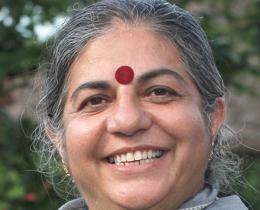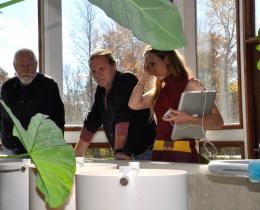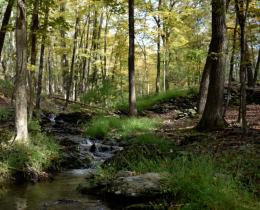During the Omega Center for Sustainable Living's 2014 Where We Go From Here conference, internationally renowned seed activist Vandana Shiva met a group of Hudson Valley farmers, gardeners, and seed activists working to establish seed sovereignty in the region. Ken Greene, cofounder of the Hudson Valley Seed Library, said meeting Vandana Shiva was "a seed saver's dream come true."
When she spoke, Dr. Shiva urged everyone present to "get involved in the [Hudson Valley] Seed Library and challenged us all with the idea of creating a Hudson Valley Seed Freedom Zone," said Greene. "After a decade of working on seed issues for our region, I felt reinvigorated to continue our work preserving, developing, and celebrating seed diversity."
But what exactly does "seed freedom" mean, and why is it so important in the Hudson Valley and beyond?
Seeds Are a Common Good
As SeedFreedom.eu (an international coalition of groups advocating for seed freedom in the European Union) explains, “Seeds are a common good. They are a gift of nature and the result of centuries of hard work of farmers around the planet who have selected, conserved, and bred seeds. They are the source of life and the first link in our food chain.”
Vandana Shiva says, in an interview with Yes! Magazine, “The seed in its essence is all of the past evolution of the Earth, the evolution of human history, and the potential for future evolution. The seed is the embodiment of culture because culture shaped the seed with careful selection…. It is the ultimate expression of life.”
The seed is a perfect knowledge storage device—the ultimate hard drive. In each seed is contained the entire history of agriculture, in an open-access framework, for anyone to use, reuse, and tinker with. A seed is thousands of years of agricultural history in the palm of your hand.
Yet this age-old system of knowledge transference and storage is being severely diminished through a combination of consolidation of seed suppliers and the rise of genetically modified crops.
Though the majority of the world's food still comes from small farms, in the global North (and increasingly in the South) a small number of companies control what seed gets produced, who gets access to it, and at what price. Six companies control three-quarters of private sector plant breeding research and 60 percent of the commercial seed market.
Additionally, patents on both genetically modified and nongenetically modified seed make it illegal for farmers to save and exchange seeds from these corporations. And the threat of being sued if patented seeds drift to nearby fields and sow themselves without a farmers’ knowledge keeps many farmers from growing certain crops.
Crop Diversity Provides Food Security
Over the past century, the UN Food and Agricultural Organization says, the diversity of cultivated crops has declined by 75 percent, with a third of the remaining diversity at risk of disappearing by 2050 as regional differences in diet and cultivation decrease.
The banana is the quintessential example of the importance of crop diversity. Though there are thousands of varieties of bananas, 99 percent of those grown for export are the variety Cavendish, which are able to withstand the rigors of global production and distribution better than other varieties. But this variety is getting hit by an untreatable fungus. Roughly 70 percent of nonexport banana varieties are vulnerable to this fungus as well, which poses a grave threat to the 400 million people who depend on bananas for basic sustenance.
To stave off this potential disaster, plant breeders are searching for varieties to replace the Cavendish. The likelihood of finding a disease-resistant variety increases with the number of varieties still in cultivation.
The same is true when searching for crop varieties that will be better able to withstand climate change—the best chance is in crop diversity. For example, "evidence suggests that alternatives to GE [drought-tolerant corn]—classical breeding, improved farming practices, or crops naturally more drought-tolerant than corn, such as sorghum and millet—can produce better results, often at lower cost," reports the Union of Concerned Scientists in 2012.
Conventional crop breeders, relying on stored bean varieties, also identified 30 varieties of common beans that can withstand coming temperature increases and grow in conditions that will cause crop failure in other varieties.
In each of these cases, without an existing storehouse of seed—either in the field, being grown by farmers, or stored in seed banks—the options for finding and developing new varieties are limited.
It then becomes important to ask who controls this "bank" of seeds: farmers who work together in a bottom-up system, or corporations who control supply and distribution in a top-down way.
Seed Libraries Re-Democratize Seed Saving
The seed freedom movement and local seed libraries offer a counter narrative to the industrial, corporate model of seed distribution and control.
In the case of the Hudson Valley Seed Library, members paid an annual fee and agreed to grow the same variety of a plant for a season. They learned to identify desirable traits, performed crosses, and then saved the seed they grow. Members also received a discount on the heirloom varieties sold by the library, which in this case is a for-profit entity.
Other seed libraries have operated as nonprofits, and some are much larger in scale.
What unites all of them is that rather than going to a corporation for seed, participants share seeds in a peer-to-peer relationship similar to how cooperatives operate. The people who produce the seed are the ones who will later grow it themselves. It’s coproduction and coconsumption, in an interdependent way, based on free association rather than the linear producer-consumer relationship of corporate development and distribution of seed. With seed libraries the circularity of the agricultural process is maintained, whereas with the corporate model a break in the cycle exists.
Seed libraries and seed freedom are important components of a democratic system that is more likely to ensure food diversity, food security, and economic security, and be resilient to climate change.




